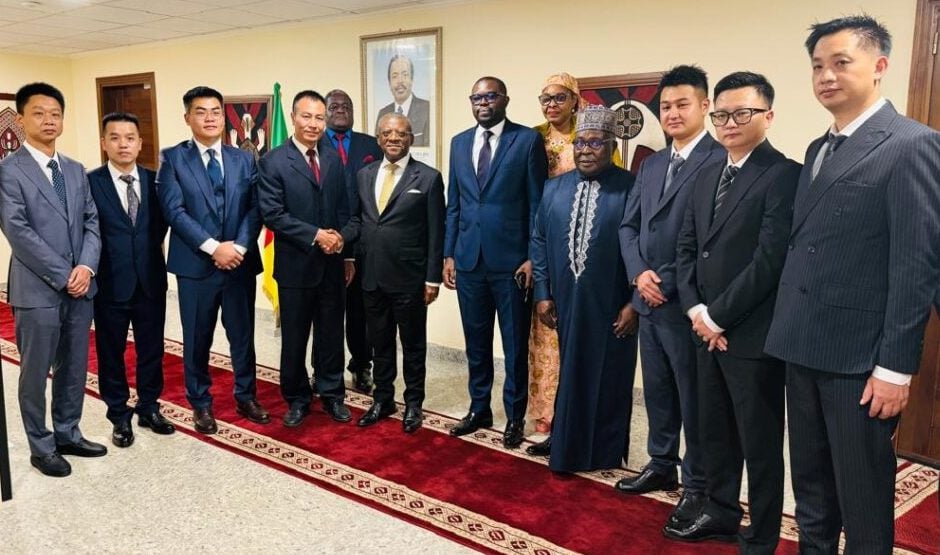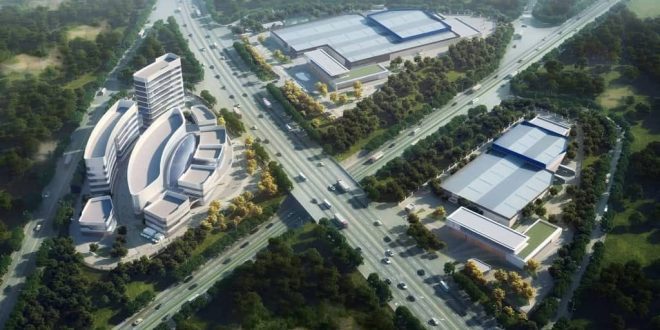CameroonOnline.ORG | Yaoundé, Cameroon – Cameroon is set to strengthen its health and industrial sovereignty with the launch of a $948 million (about 530 billion CFA) integrated pharmaceutical and medical devices complex in Meyo, on the outskirts of Yaoundé IV, near the highway leading to Yaoundé Nsimalen International Airport.
The project, spearheaded by Yicheng Pharmaceutical Group Fabrication Co. Ltd. under a Sino-Cameroonian partnership, was officially inaugurated by Prime Minister Joseph Dion Ngute. It is one of the country’s largest industrial health ventures to date and aims to reduce Cameroon’s dependence on imported medicines — currently above 90 percent — to less than 25 percent in the short term.

A Strategy to Reduce Import Dependence
For decades, Cameroon and its neighbors in the Central African Economic and Monetary Community (CEMAC) have relied heavily on pharmaceutical imports to meet domestic health needs.
This project seeks to change that dynamic through local manufacturing of essential medicines and medical devices, covering more than 100 product references in six pharmaceutical forms, including injectables and oral treatments.
The plant, located on a 5-hectare expandable site in Meyo, will include modern production facilities, internal quality-control systems aligned with Good Manufacturing Practices (GMP) and ISO 9001 / ISO 13485 certification standards.
Three-Phase Development Plan
The initiative is structured in three phases.
The first phase, entirely self-financed with 10 billion CFA francs, covers the construction of the main production unit between July 2025 and January 2027, when the first output is expected.
At full capacity, the plant will produce annually:
-
100 million bottles
-
2 billion injectable ampoules
-
10 billion tablets
Future phases will integrate the CEMAC zone (SEMAC) to enable regional supply and export beyond national borders.
Creating Jobs and Reducing Costs
The Meyo complex is expected to generate 300 to 500 direct jobs in its initial phase and over 1,000 direct jobs in the medium term, in addition to thousands of indirect opportunities across logistics, research, and distribution.
According to project officials, economies of scale should help reduce the average cost of medicines by 20 to 35 percent, thereby improving access to treatment and supporting public health programs such as malaria control and maternal care.
Beyond Manufacturing: A Comprehensive Health Hub
The project’s second phase will see the construction of a modern hospital complex, a research and development center, and a network of large pharmacies.
This integrated approach aims to create a full health ecosystem capable of supporting innovation, education, and regional distribution.
The site’s proximity to the Yaoundé–Nsimalen highway provides strategic logistical advantages for both national and regional supply chains.
Toward Pharmaceutical Sovereignty in Central Africa
Initially conceived for another Central African country, the Yicheng project was eventually established in Cameroon following a strengthened Sino-Cameroonian partnership.
Its long-term goal is to boost pharmaceutical autonomy across Cameroon and five other CEMAC member states, ensuring a more sustainable and equitable supply of medicines.
With this project, Cameroon reaffirms its ambition to become a regional hub for pharmaceutical production and a leader in promoting health sovereignty across Central Africa.
.
 CameroonOnline.org Cameroon news, Actualité Camerounaise, live Web TV & Radio, World News and a lot more
CameroonOnline.org Cameroon news, Actualité Camerounaise, live Web TV & Radio, World News and a lot more

